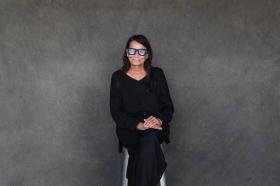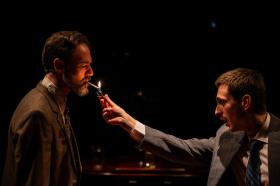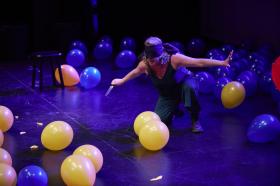Some 30 years after Arthur Miller’s lament of the death of the American Dream in Death of a Salesman, David Mamet wrote his Pulitzer Prize winning play, Glengarry Glen Ross. Instead of lamenting the loss of the ideal, Mamet took the death of the American Dream as given, or rather, proposed it never really existed in the first place. This dark and satirical drama explores power, greed and survival, and exposes the disingenuousness at the heart of American entrepreneurialism (and therefore, America itself).
Little y Theatre Company have taken this hardbitten modern classic depicting an invidious power struggle between middle-aged men and transposed it to incorporate a young, all-female cast. According to director, Mark Storen, this is not an analysis of gender; rather the intent of the casting is to allow Mamet’s fiery and brutal language to exist on its own, while presenting the story in an alternate, slightly surreal world where female salesmen brawl over sales margins and brag about their sexual prowess. While the piece stumbles in its pacing and struggles with some character authenticity issues early on, this production of Glengarry Glen Ross is blistering and unsettling – the latter particularly so in its moments of absurdism, occasionally bringing to mind the deeply haunted films of David Lynch.
Times are hard in a Chicago real-estate office: it’s the early 1980s and salesmen Shelley Levene, Richard Roma, Dave Moss, and George Aaronow and their supervisor, John Williamson, are given a strong incentive by Mitch and Murray (the unseen bosses of the company) to succeed in a sales contest. The man at the top wins a Cadillac; the man on the bottom gets fired. There is no room for losers: only ‘closers’ will get the good sales leads. A microcosm of a competitive capitalist culture, every man must work for his own success yet also design his co-workers’ failure. Driven by the overwhelming pressure to succeed, a robbery is committed which has an unforeseen impact on the livelihood of all the characters.
Storen’s direction is refreshing: confident, taut and risky. Keeping his seven characters on a small, claustrophobic stage throughout the piece (hemmed in by a prime piece of 3m x 5m real estate) the acts meld seamlessly together from Chinese restaurant to real estate office, somehow allowing each deal, double-crossing and counter-deal between the five salesmen to appear private and on the QT in spite of the loud and loquacious nature of it all. The design team work in harmony to create an historical pastiche: Fiona’s Bruce’s costumes bring to mind the ‘chrome and leather’ look of the 80s, while the office is furnished with designs from the 60s. Joe Lui’s lighting provides a noir-ish 40s tone — soft shadows, dark corners, flickering neon lights. Music designers and local producers The Bosons (Andrew Weir and Ben Collins) mash aspirational 80s rock with cold industrialism and buzzing glitches to underscore the fraying nerves of the salesmen.
As an ensemble piece, the play commands pristine delivery of the fast, idiosyncratic dialogue, and strong characterisations of the oscillating egotism and vulnerability of each salesman. The cast, for the main, achieve this, particularly hitting their stride when they allow their own interpretation of the characters to emerge, without delivering a self-conscious parody of masculine mannerisms or gestures. Ella Hetherington as top dog salesman, Richard Roma, stands out in making the character her own. She is charming and cold, dynamic and loathsome simultaneously without once acting ‘like a man’. The turning of the tables of power between Georgia King’s John Williamson and Leanne Curran’s Shelley Levene is also a highlight; a visceral exchange that reduces Levene to a pathetic, grovelling figure. Holly Garvey’s portrayal of the timid and easily confused Dave Aaronow provides some comic relief, against the ruthlessness of the other salesman.
Dark and occasionally satirical, Mark Storen and his cast exhibit the deviousness of the salesmen in a sexier but equally heartless world that Mamet excavated in his original script. This is the final show at The Blue Room Theatre for 2012 and with only one more week left in the season. Stop reading and book your tickets now.
Rating: 4 stars out of 5
Glengarry Glen Ross
By David Mamet
Directed by Mark Storen
Costume and Set Design: Fiona Bruce
Sound Design: Ben Collins and Andrew Weir
Lighting Design: Joe Lui
Stage Manager: Donelle Gardiner
Cast: Georgia King, Leanne Curran, Ella Hetherington, Alexandra Nell, Holly Garvey, Verity Softly and Caris Eves
The Blue Room Theatre, Northbridge
20 November – 8 December





